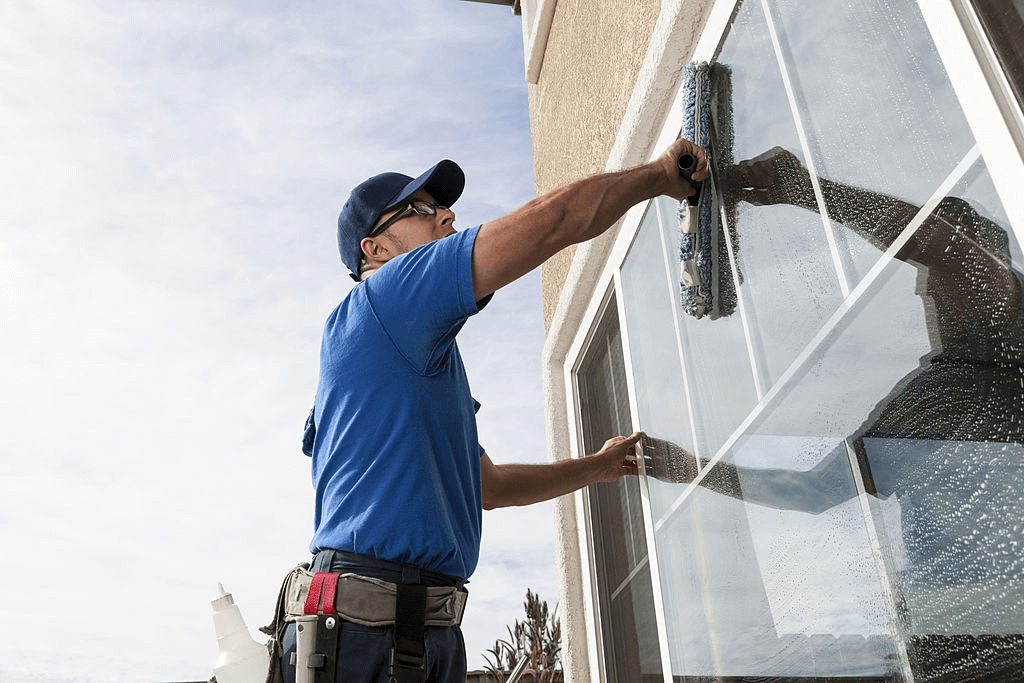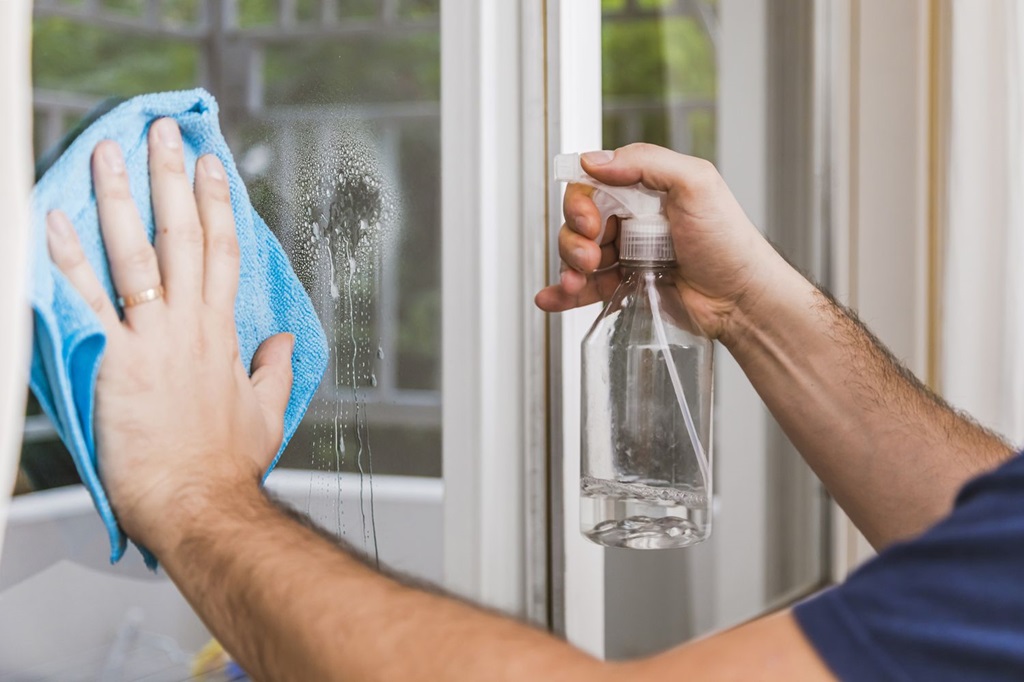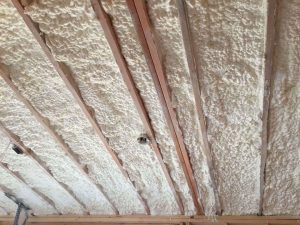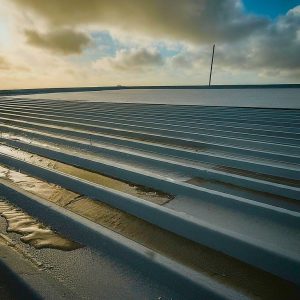Regularly cleaning the exterior windows of your home is an essential maintenance task that not only helps to keep your home looking its best but also preserves the integrity of the windows. Over time, dirt, grime, and environmental pollutants can build up on the glass surface, leading to discoloration and even damage. Using the appropriate window cleaning solutions and techniques, you can spotlessly clean windows without too much effort.
A good rule of thumb is to clean your windows at least twice a year, preferably in the spring and fall. Still, more frequent cleaning may be required if you live in an area with high humidity or air pollution or if your windows are exposed to salt spray or other corrosive substances.
You’ll need a few essential tools, such as a bucket, squeegee, microfiber cloth, and a cleaning solution to clean your windows effectively. When cleaning your windows, avoiding using abrasive cleaners or rough materials that can scratch the glass surface is crucial. Instead, opt for a mild cleaning solution such as a mixture of water and vinegar or dish soap. We will discuss everything you need to know about selecting and preparing practical outside window cleaner solutions.
Why It’s Important to Clean the Outside of Windows
There are several benefits to washing the exterior side of your windows regularly:
- Improves appearance – Over time, outdoor windows can accumulate dirt, dust, pollution, rain spots, bird droppings, and other buildup. Washing removes these impurities to restore clarity and luster. Clean windows look more attractive.
- Allows sunlight to enter – When outdoor windows are dirty, it blocks some natural sunlight from entering your home. Cleaning them will enable maximum light through.
- Helps window treatments last longer – Built-up grime and pollutants can shorten the lifespan of window screens, blinds, and curtains. Keeping outdoor glass clean helps window treatments stay in better condition longer.
- It makes it easier to see outside – Filmy residue, splatters, and debris on external glass obstruct your view. Washing keeps your line of sight clear.
- Prevents permanent damage – Bird droppings and calcium deposits from water can etch exterior glass surfaces if left too long. Regular cleaning contains permanent marks.
- Improves window insulation – Dirt and contaminants degrade insulating seals around windows. Cleaning can maintain insulation value.
- Enhances curb appeal – Spotless, shiny windows can make your house look cleaner and more appealing. It’s often one of the first things people notice.
Washing outdoor windows with outside window cleaner at least a few times yearly reaps all these essential benefits.
How Often You Should Clean the Outside of Windows
How frequently you should clean your home’s exterior windows depends on a few factors:
- Location and climate – Homes in arid climates or rural areas may only need cleaning 1-2 times a year. Urban environments and climates with more rainfall may necessitate 3-4 times yearly.
- Exposure to pollutants – Windows facing roadways or industrial areas will collect more grime from vehicle exhaust and require more frequent cleaning.
- Presence of trees or birds – Nearby foliage can shed plant debris onto glass. Birds visiting your windows lead to droppings. Clean as often as needed to remove these deposits before they adhere.
- Hard or soft water – Mineral deposits in hard water will cause spotting. Soft water allows the use of more dilute cleaning solutions.
- Screen condition – Poorly fitting screens allow more dust and dirt inside the window frame. Keep screens in good repair so windows stay cleaner longer.
- DIY or professional cleaning – Hiring a service means you can clean less often yourself. Doing the work on your own necessitates more frequent sessions.
- How quickly windows get dirty – Check windows periodically for buildup. Adjust your cleaning schedule accordingly.
Pay attention to how quickly residue accumulates on your exterior glass. Tailor your washing regimen to keep them looking their best.
Supplies Needed for Washing Outdoor Windows
Gathering the right supplies will make washing your home’s outdoor windows safer and easier:
- Bucket – Use 1-2 buckets to hold the cleaning solution. Five-gallon buckets allow you to mix larger volumes.
- Sponge – Opt for a large rectangular sponge that fits your hand. Avoid abrasive types that could scratch.
- Soft cloths and towels – Have plenty to wipe down frames and glass. Microfiber or high-quality cotton work best.
- Squeegee – Choose a professional-style squeegee with a 10-12 inch rubber blade. Extension poles let you reach higher windows.
- Mild detergent – Look for a liquid dish or hand soap without additives that could streak. Baby shampoo also works well.
- Window cleaning spray – Keep a pre-mixed formula or concentrated cleaner on hand. Vinegar and water work, too.
- Garden hose – Use to pre-wet and rinse windows. Choose one that reaches all areas, or consider multiple hoses.
- Scrub brush – Use a soft brush to apply extra elbow grease for heavily soiled windows.
- Drop cloths – Protect shrubs and surfaces under windows with plastic sheeting while you work.
- Gloves – Rubber gloves prevent skin irritation and keep hands clean while washing.
- Ladder – Select a sturdy ladder of appropriate height to reach all your windows comfortably. Have someone steady it for you.
Assembling supplies ahead of time lets you power through the task efficiently.
Mixing Your Window Cleaning Solutions
You can buy pre-mixed window cleaners, but making effective homemade solutions is also easy and affordable.
Here are some recipes to try:
- Vinegar and Water
- Supplies Needed: White vinegar, water, spray bottle
- Mixing Instructions: Fill spray bottle 1/3 with white vinegar and 2/3 with warm water. Shake well to blend.
- Notes: A classic homemade recipe. Vinegar cuts through dirt, and water helps it rinse away.
- Dish Soap and Water
- Supplies Needed: Mild liquid dish soap, water, spray bottle
- Mixing Instructions: Add 2-3 drops of soap per cup of warm water. Shake the spray bottle to mix thoroughly.
- Notes: A small amount of soap combined with water cleans the glass effectively.
- Rubbing Alcohol and Water
- Supplies Needed: Rubbing alcohol, water, spray bottle
- Mixing Instructions: Mix equal parts rubbing alcohol and water. Transfer to a spray bottle.
- Notes: The alcohol in this solution helps dissolve oily deposits.
- Multi-Ingredient Cleaner
- Supplies Needed: White vinegar, rubbing alcohol, cornstarch, warm water, spray bottle
- Mixing Instructions: Mix 2 cups warm water, 1/4 cup vinegar, 1/2 tsp cornstarch, and 2 tbsp rubbing alcohol. Pour into a spray bottle.
- Notes: The cornstarch prevents streaking in this more heavy-duty formula.
- Essential Oil Cleaner
- Supplies Needed: Water, white vinegar, essential oil, spray bottle
- Mixing Instructions: Mix 2 cups water, 1/4 cup vinegar, and 15 drops of lemon essential oil. Shake and pour into a bottle.
- Notes: The natural oil gives this cleaner a refreshing citrus scent.
Test out a variety of homemade mix-and-match cleaners to find your favorite cleaning solutions for sparkling outdoor windows!
Prepping Windows and Surrounding Surfaces
Proper preparation is vital before washing your home’s external windows:
- Sweep outdoor porches, patios, or other surfaces beneath windows to remove leaves, dirt, and debris.
- Cover surfaces under windows with plastic drop cloths to protect from drips and spills.
- Clear window frames and sills of any removable items like planters or decor.
- Check for bee hives or wasp nests attached to the home near windows. Remove before proceeding.
- Remove window screens and set them aside carefully. Wash separately later if needed.
- Hose down the exterior walls and window glass with water to pre-wet surface dirt and dust.
- Make sure you have a sturdy ladder placed on level ground. Have someone hold the ladder steady.
- Never lean ladders against window panes. Keep ladders on secure ground.
- If washing second-story windows, close any open windows on lower levels.
Prepping your work area helps you clean efficiently while protecting your home.
Washing Windows and Window Frames
Once prepped, follow these steps to clean outdoor windows and frames thoroughly:
Cleaning Glass
- Dip your cleaning sponge or cloth in your prepared cleaning solution and wring out excess.
- Wash window glass using gentle vertical strokes. Avoid circular scrubbing.
- Look for any stubborn dirt or splatters and focus extra attention there if needed.
- Try to clean on an overcast day or work in sections to avoid streaking in direct sun.
- Use a garden hose on a low setting to gently rinse away the cleaning solution.
- Squeegee any remaining water off in vertical strokes using an extension pole for the upper windows.
- Wipe edges dry with a lint-free cloth and inspect closely for any residue.
- Repeat washing if any hazy residue remains. It’s better to take extra time now than have streaks later.
Cleaning Frames and Sills
- Use your cleaning cloth to wipe down the entire exterior frame and sill to remove built-up grime.
- Apply some elbow grease with a scrub brush to loosen any stuck-on gunk. Take care around old paint.
- Use detail brushes to remove cobwebs, dirt, and debris from nooks and crannies.
- Blast away loosened dirt with a strong water spray or use a damp cloth to wipe clean.
- Check for any remaining algae, mildew, or gray wood rot on frames. Use bleach solutions sparingly on affected areas.
- Allow everything to dry thoroughly in the sun after rinsing. Wipe down any leftover drips.
Thoroughly cleaning windows and all surrounding framework makes a dramatic difference in your home’s appearance.
Best Practices for Safe and Effective Window Washing
Follow these tips as you wash outdoor windows for the best results:
- Wash windows on an overcast day or work in shaded sections. Direct sun causes cleaning solutions and water to dry too quickly, leading to streaks.
- Use lukewarm or cool water rather than hot, which could crack window glass.
- Always hose down the exterior before scrubbing to pre-wet and loosen debris.
- Know which windows are cleaned best inside vs. outside. Clean inside, if possible, for second-story windows.
- Change cleaning water often to prevent transferring dirt between windows.
- Rinse windows thoroughly with gentle spraying to eliminate all soap residue.
- It is dry glass and frames nicely with a squeegee, towels, and fans. Streaks can form as moisture evaporates.
- Never mix cleaning products as toxic. Fumes can result. Stick to one recipe per washing session.
- Wear protective eyewear, gloves, and clothing during cleaning. Ladders and heights pose safety issues.
- Hire a professional instead of risking injury for hard-to-reach second-story windows requiring tall ladders.
Remaining patient, working carefully, and using proper protective gear keeps you safe while delivering immaculate results.
Maintaining Clean Windows In-Between Washings
To minimize dirt buildup between full cleanings, make these habits part of your regular home maintenance:
- Vacuum window tracks and sills regularly to remove debris that causes problems.
- Keep screens, seals, and window hardware in good repair to prevent dust entry.
- Prune back nearby trees and bushes to reduce vegetation debris, pollen, and window pests.
- Install window awnings or solar shades to protect top windows from weathering.
- Use rain-repellent treatments like Rain-X® to make water bead and wash away residue.
- Hose down exterior glass whenever you notice light dirt accumulation starting.
- Spot clean exterior glass as needed with simple spray cleaner and microfiber cloths.
- Feather dust window sills and frames weekly to stop dust buildup.
- Limit opening windows when fertilizing lawns, painting, or during high pollen seasons.
- Keep window shutters closed when dusty winds blow.
- Install ultraviolet protective window film to reduce damage from sunlight.
With attentive care between deep cleanings, your beautiful, clean windows will maintain their splendor longer.
Conclusion
Whether your windows are coated in a light film of dust or heavily soiled with embedded debris, the satisfying sparkle of clean windows makes washing exteriors worthwhile. Stock your supplies, mix up some homemade cleaners, and get scrubbing! Stay safe on ladders while methodically working top to bottom. Beautiful, refreshed windows will let more natural light into your home and provide stunning curb appeal. Just keep them cleaner longer with regular maintenance habits in between deep cleanings. With this complete guide to effectively washing the outside of your home’s windows using outside window cleaner, you’ll confidently tackle this essential task.
FAQs
1. Is it better to clean windows inside or outside?
It’s best to wash exterior glass from the outside whenever possible. Doing so lets you thoroughly clean the outside face, frames, sills, and screens as a complete unit. Start inside if external access is limited.
2. Can I use a pressure washer to clean the outside of windows?
It’s not recommended. The powerful pressure washer spray can damage window components and drive water into the home. Use a gentle garden hose spray or bucket and cloth instead.
3. How do I clean outdoor windows safely on the second story?
Use an extension pole and squeegee to reach the top windows from the ground. Rent a water-fed pole system for a complete touchless wash. Have professional, clean, hard-to-reach upper exterior windows rather than take risky chances on tall ladders.
4. What’s the best technique for cleaning screens?
Remove screens and wash them gently with a soft brush and mild detergent. Rinse thoroughly. Let dry completely before reinstalling so metal frames won’t rust.
5. Why does my glass look streaky after washing the outside?
Streaks are usually caused by not thoroughly rinsing away cleaning solutions. Re-wash streaky areas with just water and dry thoroughly with a squeegee. Avoid washing in direct sunlight, which dries solutions too fast before they can be rinsed.







Average Rating